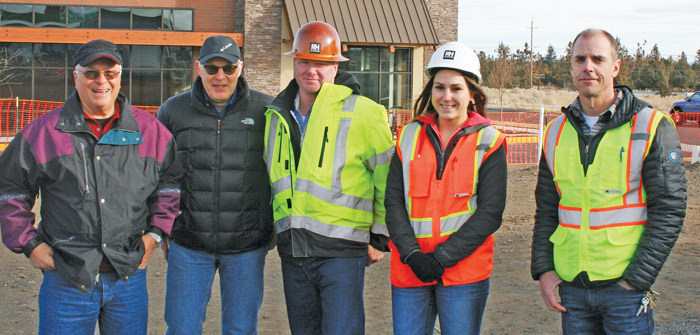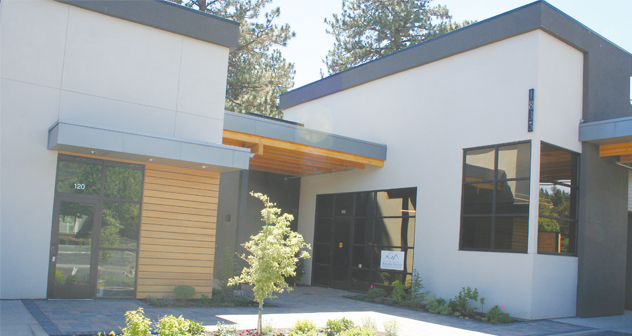Anyone walking through the front doors of Oregon State University’s Cascades Campus in northwest Bend will notice the left-hand wall is stocked full of brochures for the 15 different bachelors degrees offered at the school.
Four-year degrees are available from both OSU and the University of Oregon, including BS degrees in business administration, tourism and outdoor leadership, and education – all industries with demand for workers here in Central Oregon.
But students taking the coursework needed to fulfill those degrees typically start out with two years of classes at Central Oregon Community College, transferring to OSU for the final two years of their desired program.
Having a true four-year university in Bend has been discussed among business, city and economic development leaders for at the better part of the last decade, but hardly any forward progress has been made toward Bend becoming a college town. With the recent economic struggles felt across the U.S., talk of bringing a four-year college to Bend has started up again.
“To bring a four-year research institution here would take figuring out the feasibility and if the market can support it,” said Christine Coffin, director of communications and outreach for the OSU-Cascades Campus. “It would take a lot of involvement with local businesses. I know the community really wanted a university here. They organized themselves and many members of the community were not only very influential here (on the subject) but spoke from educated positions.”
Several years ago, the State of Oregon asked OSU and the U of O to present proposals defining how they would create a campus here. OSU won the proposal, and a model for higher education with OSU programs was brought to the Cascades Campus. However, when the state awarded OSU the go ahead they also added the stipulation that they needed to work with the U of O, and a handful of other education partners, because he Eugene-based college brings educational wealth that OSU doesn’t have, and vice versa, observers remember.
But when the campus started, it was not a true four-year, Stanford-like university, which was ideally what the community wanted, so the school wasn’t funded in that way. When campus opened in September 2001, it was only two or three days later when 9/11 occurred, and university funding dropped even more.
“The community had huge expectations, and the campus came in lower than the reality they had hoped would happen, and it fell even further from those expectations after 9/11,” said one OSU employee who wished to remain nameless.
OSU Cascades has now been in business for seven years, basically as an entrepreneurial organization funded through the state and through tuition, and all of its partners, except for the U of O, have fallen away. However, Diana Sloan, who took over as the OSU Cascades Campus director in July 2007, is working with advisory board members who interested in revising a strategic plan for creating the right academic program mix for the community. She is also on the Economic Development for Central Oregon board, involved in dialogues with EDCO Director Roger Lee and others on a regular basis.
Steve Petersen, who has been an active member in Central Oregon’s economic development, both on the public and private sides, for the last 30 years, has long been an advocate of creating a local four-year university to help spur the local economy. Petersen, who says he is mostly retired now, says the link between economic development and education is a strong one.
“There has been a lot of discussion in the community for a long time about having a four-year institution,” Petersen said. “In 2000, when OSU Cascades first came here, that was the idea. An educated work force is critical to local companies, whether we’re talking high school diplomas, two-year training degrees, four-year bachelors or graduate diplomas. If you look at this community, much of our success stems from technology-driven and knowledge-based companies. We don’t have the assets of a freeway or a seaport, so we are fairly focused on the attracting those kinds of companies – software firms, aviation companies – and they normally do very well here.”
Petersen said that although he’s listened to a lot of discussion about funding levels, he still does not have an answer as to what needs to be done locally to bring a four-year university to Bend.
“One thing we need to understand clearly is what the needs are here, what it is the business community is looking for, and what the community as whole is looking for,” he said. “The big issue is that in order to build community support, we have to work with higher education folks to see if we can get the funding in place. But it is a difficult situation getting funding for higher education at the state level in recent years, and for some reason my instinct tells me that’s not going to improve much in the future. We need to first build a base of good community and business support. I don’t have a magic answer nor do I believe anybody does. I do know that there is a true desire to make this successful, but nobody really has the total answer.”
William Schweke is the research director for the Corporation for Enterprise Development based in Durham, North Carolina, home to Duke University and part of a region with no less than four major universities, including University of North Carolina at Chapel Hill, North Carolina State University and North Carolina Central University.
Schweke says the economic problems associated with unequal growth – stagnant wage growth and depressed market demand – in turn exacerbate social problems, such as crime, drug abuse, and family break-ups, which are some issues that are on the tips of the tongues of many Central Oregon residents, especially during the unprecedented growth of recent years.
“The most forward-thinking approach to solving these problems and increasing competitiveness is to equip today’s and tomorrow’s citizens with the skills and attitudes for economic and civic success in an increasingly knowledge-based economy,” he said. “There is a growing consensus that money spent wisely on education pays off not only for workers but also for communities and businesses. Educational attainment raises incomes and increases productivity, while failures in educating the workforce are associated with higher levels of crime and welfare dependency.”
Eric Strobel, director of business development for EDCO, said from the standpoint of workforce development one of the biggest benefits to local companies is being able to have a system for training new hires, and to improve the skills of existing workers.
“For instance, Toyota in Kentucky, they have a very good relationship with their local university and they do a lot of work with them, as far as providing workers and skilling up existing workers,” Strobel said. “Even as far as creating specialized programs to house those workers. That kind of worker pipeline is just vital (to a regional economy).”
Strobel added that existing local companies often look outside the area when recruiting for positions because there is not a specialized, highly-trained engineering workforce, and that the first question many companies ask that are considering a move to Bend is do you have a four-year university?
“I can’t say how many recruitments we’ve lost because of that, but I know there’s been a few,” Strobel said. “COCC and OSU both do an excellent job with the resources they have, but a four-year university has so much more of a draw. We really need an engineering degree, especially, because local manufacturers have to look outside the area all of the time for graduating students. It would be wonderful to have a pipeline of engineering students who go to school here, and many of them would probably want to stay here after graduation. As Bend continues to grow, there will be a lot more resources and opportunities for people, and students who get a four-year degree here would be likely to stay.”




